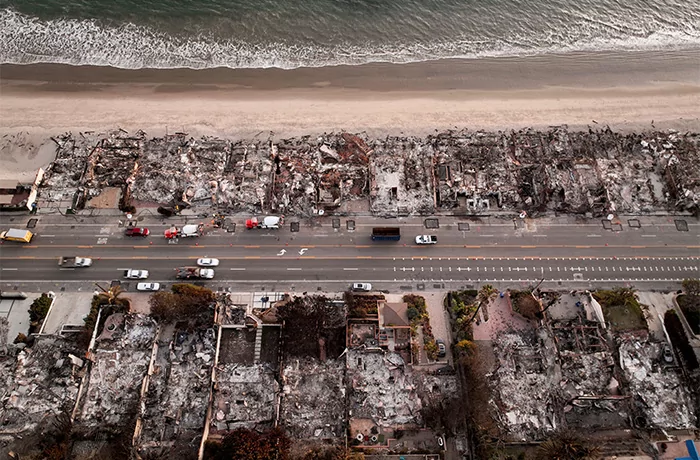CA bill may fund low-income housing in Palisades and Altadena

Overview of SB 782 and Climate Resilience Districts
A new bill in California, known as SB 782, is making its way toward the governor’s desk. If passed, this legislation would establish “Climate Resilience Districts” (CRDs) aimed at funding affordable housing in areas affected by natural disasters, such as Pacific Palisades and Altadena. This initiative mirrors a similar proposal, the “Resilient Rebuilding Authority” bill, which was paused in July due to public concerns.
SB 782, introduced by State Sen. Sasha Perez, D-Alhambra, and backed by Los Angeles County, has already cleared the State Senate and received support from its first State Assembly committee without any opposition votes. The bill proposes creating CRDs that could issue bonds or use other revenue sources to replace lost low- and moderate-income housing. It also aims to fund affordable housing development under specific provisions outlined in California Government Code Section 53398.52.
According to the law, housing built using special district financing must be deed-restricted for at least 45 years if owner-occupied, or 55 years if rented out. The funds could also be used for preventing displacement, which often involves rental assistance programs, and for workforce development and job training initiatives.
Key Provisions and Implications of SB 782
The primary goal of SB 782 is to accelerate rebuilding efforts through emergency procurement and expedited approvals. LA County argues that this approach will help communities like Los Angeles County rebuild stronger and more resilient by supporting housing, infrastructure, risk mitigation, small business recovery, and workforce development.
Additionally, the bill allows CRD funds to be used for water and energy resource access during emergencies and natural disasters. It also includes measures to underground and harden electrical lines and other utilities, which can reduce wildfire risks and improve response times.
Recent investigations into the Eaton Fire, which devastated parts of Altadena, Pasadena, and Sierra Madre, suggest that the fire may have been sparked by an abandoned power line. This highlights the urgent need to upgrade energy infrastructure in fire-prone areas.
Public Input and Concerns
One of the most controversial aspects of SB 782 is its limited public input requirements. According to the Assembly Committee on Local Government, the bill would bypass some existing public input procedures. Under current law, before CRDs can use tax increment financing, they must go through various meetings and notices. SB 782 reduces the number of required meetings from three to two and eliminates the formal protest process, which previously allowed residents to block a CRD’s adoption.
The standard protest requirement mandates that a financing district can be blocked if a majority of residents and property owners over 18 file a protest. A protest of 25-50% triggers an election on whether to proceed with the district. SB 782 removes this requirement for CRDs, raising concerns about transparency and democratic accountability.
Boundaries and Community Impact
CRD boundaries would be limited to areas with “prevalent and substantial” disaster damage, along with adjacent areas, though these cannot exceed 20% of the CRD. In the context of Los Angeles County, the Pacific Palisades and Altadena disaster areas face different challenges regarding CRD adoption.
Because the Pacific Palisades is governed by the City of Los Angeles, creating a CRD for the area would require resolutions from the city, and potentially the county if involving county-wide taxes and fees. However, Altadena, being an unincorporated community, is directly governed by LA County’s five-member Board of Supervisors. Local residents fear that SB 782 would limit their ability to influence how their community is rebuilt.
California (un)Incorporated, a coalition representing residents and businesses in incorporated areas, opposes the bill, arguing that unincorporated communities deserve the same rights and privileges as incorporated municipalities. They emphasize that Altadena, lacking a Mayor and City Council, faces unique challenges in advocating for its interests.
Additional Context and Recent Developments
Last month, Governor Gavin Newsom allocated $101 million in taxpayer funds for multifamily low-income housing development in Los Angeles, prioritizing areas near the fire perimeters of the Eaton, Hughes, and Palisades fires. This move reflects the state’s commitment to addressing housing needs in disaster-affected regions.
Earlier this year, a similar bill, SB 549, which aimed to create a “Resilient Rebuilding Authority,” was placed on hold following community pushback. Despite these developments, Perez’s office has not responded to inquiries from The Center Square as of publication.
Post a Comment for "CA bill may fund low-income housing in Palisades and Altadena"
Post a Comment